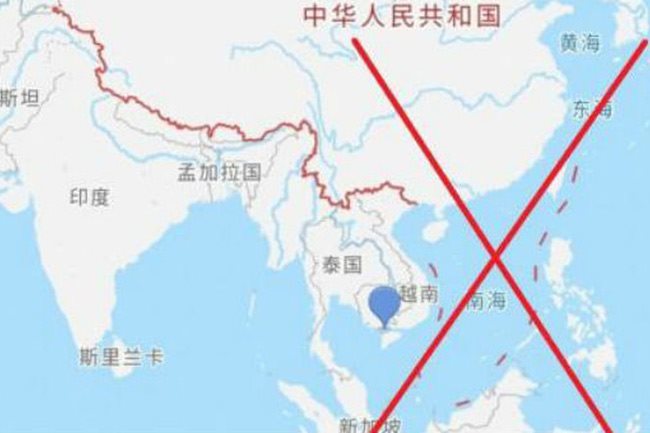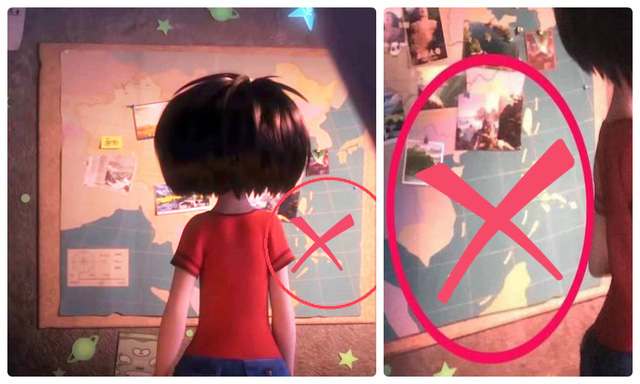Be careful with imported products featuring China's illegal nine-dash line
 |
A map featuring the illegal nine-dash line. Vietnam Southern Power Corporation reported it found inverters containing the nine-dash line map on the southern market. Photo: VNA
The "cow's tongue line" or "nine-dash line" is a concept that China relies on to claim historical rights over almost of the East Sea (internationally known as the South China Sea), which is contrary to international law. In 2016, the Permanent Court of Arbitration (PCA) issued a ruling confirming that China's declaration has no legal basis.
Vietnam has repeatedly stated that it does not accept China’s use of the cow's tongue line to encroach on Vietnam's waters. The US Department of State also said that China's nine-dash line in the East Sea is 'ridiculous and illegal'.
China's ambition is real and consistent, as shown in the fact that its people wear clothes or use passports printed with the nine-dash line. That is an unacceptable act.
In Vietnam, many cultural products from China with the nine-dash line on them have been detected.
In March 2018, the film "Operation Red Sea" made the public angry because a scene featured Chinese warships surrounding a foreign ship and forcing the ship leave the water they called the "South China Sea".
 |
A scene in the Abominable which shows China's unilaterally declared nine-dash line.
In October 2019, four cultural publications containing the "cow's tongue line" were detected: the movie ‘Abominable’ licensed by the Vietnam Cinema Department; a travel booklet produced by Saigontourist, a five-seater Volkswagen displayed at the Vietnam International Motor Show 2019, video games, and most recently, a Chinese language textbook adopted by the Hanoi University of Business and Technology. This textbook has been used as learning and teaching material for several years.
The products have been confiscated as they have seriously violated Vietnam’s law and its national sovereignty.
After mixed reactions related to the movie “Operation Red Sea”, the Ministry of Culture, Sports and Tourism came to the conclusion that based on the whole picture, sound and dialogue in the film, there was no basis to say that the film is related to the issue of sovereignty, even though in the film, the Chinese ship's speaker mentioned the "South China Sea".
An article on the Chinese Ministry of National Defense's official website dated February 18 stated that, in the final scenes of the movie, the naval patrol boat in the South China Sea (the expression that China uses to calls Vietnam’s East Sea) deported a foreign ship from the waters surrounding the so-called "Nansha Islands".
Facing this blatant affirmation, Dr. Tran Cong Truc, former Head of the Government Border Committee, said: "We must study and examine issues in an objective and scientific way, especially with caution to not fall into a 'pitfall' that is detrimental to the legal struggle to protect our legitimate rights and interests.”
After the "incident" of the nine-dash line in the movie “Everest - the Little Snowman”, a member of the film censorship council, although admitting the mistake, made a shocking statement when saying that the "cow's tongue" image in the movie was only seen for a few seconds.
The Dean of the Chinese-Japanese faculty of the Hanoi University of Business and Technology told reporters that the image of the nine-dash line in the textbook was 'tiny, fuzzy', so no one thought it was the 'cow's tongue line'.
Are these comments naive?
In the digital information age, everyone knows what the nine-dash line is. In this case, students discovered the "nine-dash line" in the textbook.
In terms of perception, Vietnam does not accept existence in any form of the nine-dash line within the territory of Vietnam and the world. Maritime sovereignty must be considered a top priority when censoring cultural products of foreign origin. The authorities need to have a special monitoring mechanism for these products.
( Nguyen Duy Xuan/Vietnamnet )
Recommended
 Seas and islands
Seas and islands
Vietnam Endorses Common Voice on Ocean Jurisdiction
 Seas and islands
Seas and islands
Dialogue as Key to Settling Disputes and Advancing Law of the Sea
 Seas and islands
Seas and islands
RoK Navy Ship Pays Friendly Visit to Da Nang City
 Seas and islands
Seas and islands
Naval Region 5 Promotes Reading Culture, Fosters Patriotism
 Seas and islands
Seas and islands
Coast Guard Region 2 Command Hosts Philippine Coast Counterpart
 Seas and islands
Seas and islands
Vietnam - Thailand Navy: Coordination to Well Address Problems at Sea
 Seas and islands
Seas and islands
Honoring the Fallen: Incense Offering for the 37th Anniversary of Gac Ma
 Seas and islands
Seas and islands
